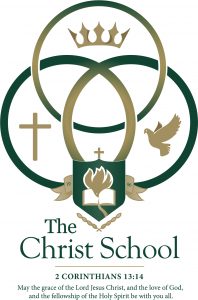Our Chapel Theme for the 2019-2020 School Year – The Trinity – Father, Son and Holy Spirit
by Mark Davis, 7th & 8th Grade Bible Teacher
This year, The Christ School’s Chapel theme is The Trinity – Father, Son and Holy Spirit.
May the grace of the Lord Jesus Christ, and the love of God, and the fellowship of the Holy Spirit be with you all.
2 Corinthians 13:14
Why the Trinity?
One of the distinctives of The Christ School is our commitment to worshiping and learning about God together through daily chapel. Every school year we learn new aspects about the Christian life through different chapel themes, and we are so excited to introduce this year’s chapel theme: The Trinity. At The Christ School, we believe in engaging students’ minds, hearts, and hands. This means we want students to grow in their knowledge of God, their affections for Him, and their love for others. It is our hope that children will grow in these three ways this year as they learn, worship, and love others at The Christ School. Exploring the Trinity in chapel this year will be a catalyst for their growth, and there are many reasons why learning about the Trinity is important. Here are just three of them:
Understanding the Trinity is important because understanding God is important
Simply put, a deep understanding of the Trinity is a deep understanding of God. Christians should strive to learn more about God because we want to know Him and make Him known. Wouldn’t it be strange if a husband said, “I love my wife, but I don’t want to get to know her more than I already do.” Of course! If you love someone, you want to know more about them. The Trinity is simply a name that describes the nature of God’s existence: one God in three persons. This doesn’t mean there are three Gods, nor that God manifests himself in three different forms. God is one being in three persons: The Father, Son, and Holy Spirit. Each person of the Trinity is fully divine, yet distinct from each other and with different roles. God did not create us out of boredom or lack, but out of the divine love that overflowed from within the Trinity. To learn about God’s triunity is to learn about His holiness and beauty. We are excited to know Him better this year.
The Trinity helps us understand the Gospel
It is common for Christians to have a one-dimensional view of salvation that falls short of what the Bible describes. Often the Gospel is seen through a humanistic lens that focuses primarily on mankind, our sin, and God’s forgiveness. While those elements are certainly true, understanding the trinitarian shape of the Gospel helps us appreciate God’s love in a new light. For example, as Christians, our identity is not that we are mere sinners who are forgiven. We are children of God adopted by the Father, purchased by the Son, and sustained by the power of the Holy Spirit.
The Father, Son, and Holy Spirit have always existed in perfect love. We were created in God’s image to reciprocate that love and have dominion over the earth [Gen 1:26]. This beautiful relationship was marred by sin, but because of God’s abundant grace, He had a plan to redeem us. The Father sent His only Son to fulfill all righteousness and die on behalf of our sins [1 John 4:14], and this plan of salvation is accomplished by the power of the Holy Spirit [John 16:7-8]. If you are a Christian today, your sins are not only forgiven, you are adopted into the family of the Trinity. Benefactors of the Father’s love, co-heirs with Christ, and indwelled by the Holy Spirit. Does that sound amazing? It is!
Knowing about the Trinity helps us discern the truth
There is a common attitude in our society that everything is relative. You may have heard the phrase, “What’s true for you is true for you, and what’s true for me is true for me.” But this way of thinking is self-contradictory. Granted, people have different opinions and preferences about things that are inconsequential. However, for ultimate issues like God, morality, and salvation, what’s true is objectively true. So in a culture where ultimate issues are seen as relative, we need to know that Christianity is objectively true, not just one option of many. C.S. Lewis makes a compelling case for this. He argued that “Christianity, if false, is of no importance, and if true, of infinite importance. The only thing it cannot be is moderately important.”
The Trinity has been the defining doctrine of Christianity since the time of the Early Church, and understanding the Trinity is just as important today as it was then. The youth of today will grow into adulthood in an increasingly pluralistic society where all truth claims are seen as valid. If their understanding of God is just like their non-Christian peers and neighbors, it stands to reason that their lives will eventually match the culture that surrounds them. Learning about the Trinity will help students understand that Christianity is distinct from other religions. There are many who claim Christianity, Judaism, and Islam worship the same God because each tradition looks back to Abraham. But if they understand the Trinity, they will know Christianity is wholly unique. Throughout their lifetime, the faith of the next generation will be challenged. By instilling a biblical understanding of the Gospel and the Trinity, it is our hope that their deeply-rooted faith will grow and flourish to bear much fruit in a world that needs our Christian witness.
